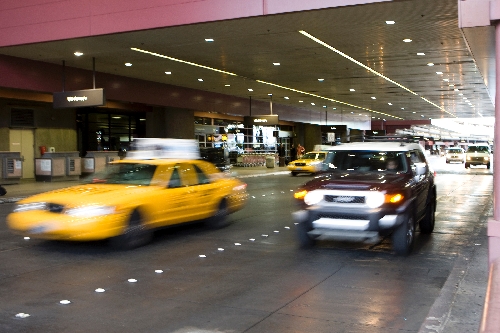Bridge to open to traffic sans fanfare

The excitement over the last couple of weeks has surrounded the newly completed O’Callaghan-Tillman bypass bridge adjacent to Hoover Dam. The public was invited to walk across the 1,900-foot-long span on Saturday. And now, the question weighing on the minds of tourists, locals, commuters and truckers is this:
When will the bridge open to traffic?
Well, those connected to the project continue to say that the $240 million bridge will open to traffic by the end of the week. A state transportation official said that road will probably open in the middle of the night, perhaps as early as tonight, without any fanfare. The announcement of the opening will likely be made the morning after the first vehicles cross it. This is done, in part, to keep people from scrambling to be the first to cross Black Canyon on the bridge.
Speaking of the bridge, an angry reader left this message (I’ll edit it to exclude the expletives): In an Oct. 15 Review-Journal story about the bypass span, why was the only company mentioned a Japanese company? Why was no mention made of the general contractor?
The guy didn’t leave a call-back number, so I thought I would address this here. Obayashi Corporation was one of a joint venture of contractors who built the bridge. The company joined PSM Construction USA. Edward Kraemer & Sons built the approach on the Arizona side and Las Vegas Paving Corporation worked on the Nevada side. Frehner Construction Company completed the link.
The caller’s anger seemed to stem from his belief that locals, or even U.S. citizens, were not on the project. The four Obayashi employees interviewed for the story were all Las Vegas residents. Obayashi is a Japanese company that operates in the United States as well as Australia and Southeast Asia.
And this from Marsha: How sad that everyone who desired to walk both sides of this magnificent landmark were denied that opportunity by erroneous information in the website!
According to organizers, they decided not to allow pedestrians on the downstream side of the bridge because of safety reasons due to the overwhelming number of people who responded to the invitation to walk the bridge. The south side of the bridge was reserved for the RTC double-deck buses so they could more efficiently and safely ferry visitors in from the Lake Mead Recreation Area.
Mark has a question about the airport: Why don’t police police the taxicabs on the departing flights area of the airport. The cabs seem to think it’s OK to stop and discharge passengers in any of three right lanes at the departing gates. That would be the curb, the right lane — maybe I can see that when it’s busy — and the middle lane. They simply stop and confused passengers have to get out, a real trick is if you happen to be on the left-hand side of the cab and have to get out into moving traffic.
The taxis, and anyone else who might drop off passengers in the right lanes, are actually following the rules. Chris Jones, spokesman for McCarran International Airport, said all three lanes are designated for passenger drop-off. The far left lane, the one that is marked with a thick line of “Bot dots,” is the through lane where traffic is not permitted to stop.
Because of the traffic volume at the airport, Jones said, it would be impossible to require every motorist to pull to the curbside lane. The majority of drivers are in that area to drop off passengers, so it makes sense to set aside multiple lanes for drop-offs and one for traffic exiting the airport.
As far as who polices the cabbies on airport property, that would be the airport ground transportation employees or the Taxicab Authority.
Allen asks: Any idea why the Regional Transportation Commission is buying Hondas rather than domestics? I have heard the argument “but they are assembled in the U.S.” often, but where does the money go? It flees the country. Why, in these economic times would a taxpayer subsidized government agency be shipping our money overseas?
The Regional Transportation Commission is allowed to piggyback bids issued by the state and that is what it did in this case. The Honda topped the bid list and that is why the RTC has the hybrid Civics in its fleet. These are the vehicles field officers who travel dozens of miles a day use. “That was the vehicle that fit the bill on the state’s bid list,” said Tracy Bower, spokeswoman for the RTC.
The state recently sought bids for a hybrid sport utility vehicle and the Ford Escape landed on top of the list. That is why the RTC also has a few of those in its fleet.
If you have a question, tip or tirade, call Adrienne Packer at (702) 387-2904, or send an e-mail to roadwarrior@reviewjournal.com. Include your phone number.